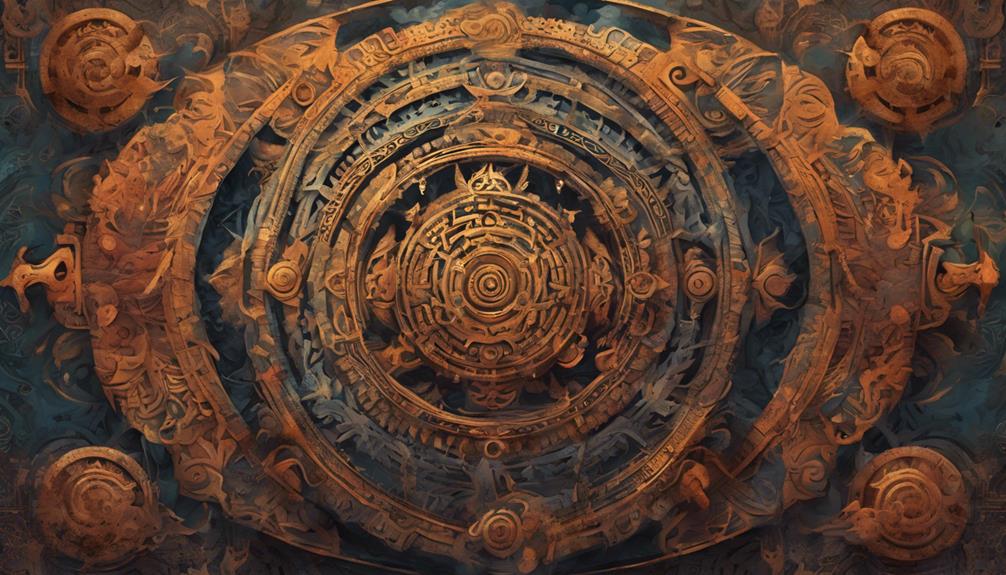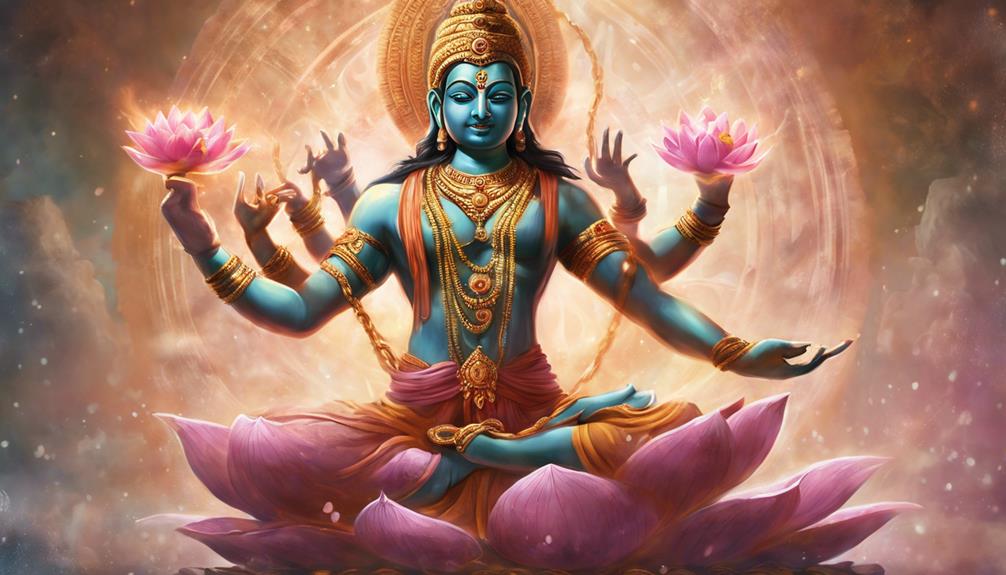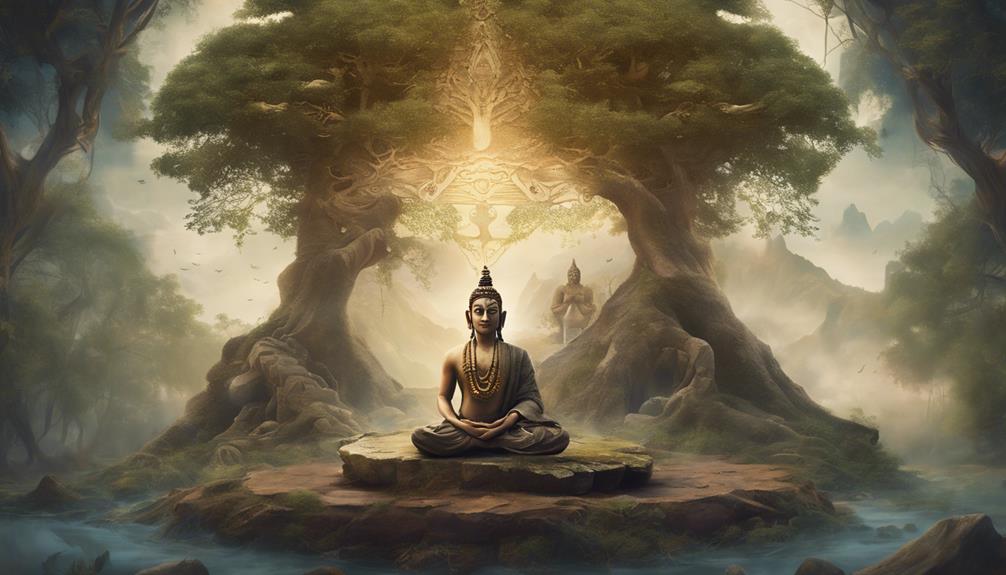Exploring Moksha in relation to Hindu gods reveals the intricate connection between divine beings and spiritual liberation. Hindu deities, such as Lord Vishnu symbolizing preservation and righteousness, and Goddess Kali representing destruction and transformation, embody qualities that assist followers in their quest for liberation from the cycle of birth and death. Understanding how these gods exemplify different aspects of the path towards Moksha can deepen your appreciation for the intricate spiritual journey within Hinduism.
Table of Contents
Key Takeaways
- Hindu gods embody qualities aiding in the pursuit of Moksha.
- Deities like Lord Vishnu symbolize righteousness and preservation.
- Goddess Kali represents transformation and destruction on the path to liberation.
- Each deity in Hinduism offers guidance towards spiritual enlightenment.
- Worship of gods assists in transcending worldly limitations for divine realization.
Origins of Moksha
The concept of Moksha, a central tenet in Hindu philosophy, traces its origins to ancient Vedic texts and scriptures. Moksha, often translated as liberation or release, holds profound significance in the spiritual journey of individuals seeking ultimate freedom from the cycle of birth and death, known as samsara. The roots of Moksha lie in the belief that human existence is characterized by suffering, caused by the cycle of rebirth driven by karma. Through the pursuit of Moksha, individuals aspire to break free from this perpetual cycle, transcending worldly illusions and attachments to achieve union with the divine.
The spiritual quest for Moksha involves a deep inner journey marked by self-realization, introspection, and detachment from material desires. It's a transformative process that requires individuals to cultivate virtues, practice self-discipline, and align their actions with moral and ethical principles. The pursuit of Moksha isn't merely a philosophical concept but a profound spiritual endeavor aimed at attaining the highest form of liberation and realizing one's true nature beyond the confines of the physical world.
Essence of Moksha
When considering the essence of Moksha, one must understand its ultimate goal of liberation from the cycle of rebirth. Breaking this cycle allows for the attainment of the divine within oneself, leading to a state of eternal bliss and unity with the cosmic consciousness.
The core of Moksha lies in the transcendence of worldly limitations to reach a state of spiritual perfection and oneness with the divine.
Goal of Liberation
In the pursuit of Moksha, achieving the ultimate goal of liberation is central to the teachings of Hindu gods. The goal of liberation, also known as 'moksha,' is the highest aim for individuals seeking spiritual enlightenment in Hinduism. It signifies the release from the cycle of birth, death, and rebirth, known as samsara.
Attaining moksha involves transcending worldly desires, ego, and attachments to achieve a state of eternal bliss and unity with the divine. Hindu gods exemplify various paths to moksha, emphasizing the importance of self-realization, righteous actions, devotion, and knowledge. Through their teachings and guidance, followers are encouraged to endeavor towards liberation by purifying their souls, cultivating virtues, and realizing their true nature beyond the material world.
Breaking Cycle of Rebirth
Breaking the cycle of rebirth, a fundamental aspect of attaining moksha, involves transcending the cycle of samsara through spiritual enlightenment and liberation from worldly attachments.
This process of breaking the cycle is rooted in the belief that individuals are bound by their actions and desires, leading to repeated births and deaths. By achieving spiritual liberation, one can free themselves from this cycle and attain moksha, which is the ultimate goal in Hinduism.
Through self-realization, detachment from material desires, and the practice of virtuous actions, individuals can purify their souls and transcend the limitations of earthly existence. Breaking the cycle of rebirth is seen as essential for reaching a state of eternal bliss and unity with the divine.
Attainment of Divine
To attain the essence of Moksha, one must explore the depths of divine realization and transcendental understanding. This journey towards divine enlightenment involves delving into the core of spiritual liberation, where the individual seeks to connect with the ultimate truth and experience a profound sense of unity with the divine.
The attainment of the divine isn't merely a process of intellectual comprehension but a transformative experience that transcends the limitations of the material world. By immersing oneself in the contemplation of the divine and surrendering to its infinite wisdom, one can unravel the mysteries of existence and free oneself from the cycle of rebirth.
Through this profound spiritual awakening, the seeker can ultimately achieve liberation and merge with the divine essence, attaining Moksha.
Hindu Gods and Moksha
Exploring the intricate relationship between Hindu Gods and the concept of Moksha reveals profound insights into the spiritual journey towards liberation in Hinduism. Deity worship plays a central role in Hinduism, where devotees engage in rituals and prayers to establish a connection with the divine. Hindu Gods aren't merely objects of veneration but are seen as manifestations of the ultimate reality, guiding individuals on their liberation journey.
Each Hindu deity embodies specific qualities and attributes that can aid followers in their pursuit of Moksha. For example, Lord Vishnu symbolizes preservation and righteousness, encouraging devotees to lead a life of moral conduct and dharma. Goddess Kali, on the other hand, represents destruction and transformation, teaching the importance of shedding ego and attachments to achieve liberation.
Moksha in Vedas

The Vedas, as the foundational texts of Hinduism, offer profound insights into the concept of Moksha. They elucidate the interconnectedness between deities and the ultimate goal of liberation.
Understanding the Vedic perspectives on Moksha provides a holistic view of the journey towards spiritual freedom.
Vedic Views on Moksha
In the Vedic scriptures, the concept of Moksha is intricately woven into the spiritual fabric of the ancient texts. Vedic perspectives on Moksha emphasize spiritual liberation from the cycle of birth and death, known as Samsara, by attaining union with the divine.
The Vedas portray Moksha as the ultimate goal of human life, where the individual soul merges with the universal consciousness, transcending worldly attachments and desires. This liberation is believed to bring an end to suffering and lead to eternal peace and bliss.
Through rituals, meditation, and righteous living, individuals in the Vedic tradition seek to realize their true nature and achieve Moksha, breaking free from the cycle of reincarnation and reaching a state of spiritual fulfillment.
Deities and Liberation
Within the Vedic scriptures, the interplay between deities and the pursuit of liberation, known as Moksha, showcases a profound spiritual dynamic that underscores the path to ultimate freedom from the cycle of birth and death.
Deity worship plays a significant role in the journey towards spiritual liberation. Each deity represents different aspects of the divine, offering devotees a path to connect with the ultimate reality. By worshipping these deities, individuals seek blessings and guidance to navigate the challenges of life and ultimately attain Moksha.
The Vedic texts provide intricate rituals and practices that devotees follow to honor and invoke the deities, fostering a deep spiritual connection. Through devotion and adherence to these practices, individuals aim to transcend the material world and achieve liberation from the cycle of rebirth.
Paths to Moksha
Explore the various pathways leading to Moksha within Hinduism, each offering a unique approach to spiritual liberation. The spiritual journey towards Moksha encompasses multiple paths, providing seekers with diverse ways to attain enlightenment and ultimate salvation.
One prominent path is the path of Jnana Yoga, which emphasizes knowledge and wisdom to achieve Moksha. Through deep contemplation and self-inquiry, practitioners seek to understand the true nature of the self and the universe, leading to inner peace and liberation from the cycle of rebirth.
Another path is Bhakti Yoga, focusing on devotion and love for the divine. By surrendering to a chosen deity with pure devotion, practitioners aim to cultivate a profound connection that ultimately leads to spiritual liberation.
Additionally, the path of Karma Yoga involves selfless action and service to others, emphasizing the importance of performing duties without attachment to the results. By engaging in actions for the greater good, individuals can purify their minds and hearts, paving the way towards Moksha.
Moksha and Deities

Deities in Hindu belief systems play integral roles in the attainment of Moksha, serving as divine guides and manifestations of spiritual principles. The connection between deities and Moksha is deeply rooted in the concept of liberation paths. Each deity represents different aspects of the divine and offers devotees a unique path towards spiritual enlightenment and ultimate liberation.
For example, Lord Vishnu, the preserver in the Hindu trinity, is associated with the path of Bhakti Yoga, emphasizing devotion and love towards the divine. By cultivating a deep connection with Vishnu, followers believe they can attain Moksha through unwavering devotion. On the other hand, Lord Shiva, the destroyer and transformer, symbolizes the path of Jnana Yoga, focusing on knowledge and self-realization to achieve liberation.
Deities like Vishnu and Shiva, along with other gods and goddesses in Hindu mythology, serve as spiritual guides, inspiring individuals to walk their unique paths towards Moksha. Through devotion, knowledge, and various practices linked to specific deities, followers seek to transcend the cycle of birth and death and reach the ultimate goal of liberation.
Symbolism of Moksha
The symbolism of Moksha extends beyond mere liberation; it encapsulates the essence of transcendence and spiritual fulfillment. In Hinduism, Moksha signifies the ultimate goal of spiritual freedom and inner peace. It symbolizes liberation from the cycle of birth, death, and rebirth (samsara), leading to a state of eternal bliss and oneness with the divine. The concept of Moksha is rich in symbolism, representing the soul's journey towards self-realization and enlightenment.
Spiritual freedom, a central theme in the symbolism of Moksha, is the liberation of the soul from the illusions and attachments of the material world. It signifies breaking free from the constraints of ego and desires, ultimately attaining a state of pure consciousness and unity with the universe. Inner peace, another pivotal element, represents the tranquility and harmony that come with the realization of one's true nature and connection to the divine. It embodies a state of profound serenity and contentment that transcends worldly suffering and turmoil.
In essence, the symbolism of Moksha serves as a beacon of hope and inspiration for spiritual seekers, guiding them towards the path of enlightenment and liberation from the cycles of suffering and ignorance.
Achieving Moksha

The pursuit of Moksha involves a profound journey towards self-realization and liberation from the cycle of birth and rebirth in Hinduism. Achieving Moksha is the ultimate goal for individuals seeking spiritual enlightenment and inner peace. It's believed that through dedicated practice, one can attain a state of eternal bliss and ultimate freedom from the material world.
To achieve Moksha, individuals often engage in various spiritual practices such as meditation, self-discipline, and devotion to a chosen deity. These practices are aimed at purifying the soul and breaking free from the cycle of Samsara, the continuous cycle of birth, death, and rebirth. By detaching oneself from worldly desires and attachments, one can reach a state of transcendence where the soul merges with the divine.
Ultimately, the journey towards Moksha is deeply personal and requires unwavering commitment and dedication. It's a profound quest for self-discovery and liberation that promises the attainment of eternal peace and ultimate freedom from the constraints of mortal existence.
Frequently Asked Questions
Can Moksha Be Achieved Through Devotion to a Specific Hindu Deity?
Achieving Moksha through devotion to a specific Hindu deity is possible. Bhakti Yoga emphasizes deity worship as a path to liberation. By immersing yourself in devotion and love for a chosen deity, the journey towards Moksha is facilitated.
How Does the Concept of Moksha Differ Between Different Sects of Hinduism?
Sectarian differences in Hinduism influence philosophical interpretations of moksha. Various sects emphasize distinct paths to liberation, impacting beliefs on the nature of moksha and the means to attain it. Understanding these variations enhances spiritual comprehension.
Is Moksha a Temporary State or a Permanent Liberation From the Cycle of Birth and Death?
Eternal freedom is the essence of moksha in Hinduism, representing continuous liberation from the cycle of birth and death. It is not a temporary state but a permanent liberation, contrasting with fleeting escapes that lack the depth of true moksha.
Are There Any Rituals or Practices Specifically Associated With Attaining Moksha?
To attain moksha, engage in meditation practices and renunciation rituals. These methods guide you towards liberation from the cycle of birth and death. By focusing on spiritual growth and detachment, you pave the way for ultimate freedom.
How Does the Concept of Moksha Relate to the Idea of Karma in Hinduism?
In Hinduism, the concept of moksha is deeply intertwined with karma connections. Your spiritual journey towards liberation paths is guided by the principles of karma, ultimately leading to the attainment of moksha through divine grace.
Conclusion
To sum up, the concept of Moksha in Hinduism is deeply connected with the idea of liberation from the cycle of birth and death.
Hindu gods play a significant role in guiding individuals towards achieving Moksha through various paths such as devotion, knowledge, and selfless action.
By understanding the essence of Moksha and following the teachings of deities, individuals can ultimately attain spiritual enlightenment and liberation from worldly suffering.